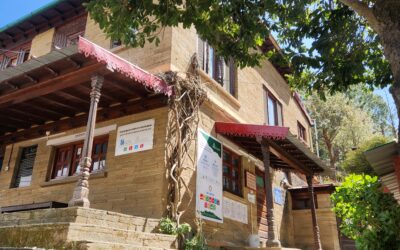The baseline survey formative data collection had been moving ahead at a brisk pace. Our team was looking to complete the qualitative research data phase for the majority of the blocks in the coming weeks. Next in line was the scheduled interviews for the Pandharkawada block, known for tribal communities. We started early in the morning considering the remoteness of the selected villages, first in order being the isolated village of Akoli Khurd. This write-up focuses on some excerpts from the fateful day’s activities and experiences and learnings gained from the encounter.
The village had a predominantly tribal population, and the family I was about to meet spoke a regional dialect, a strange mix of Telugu and some Marathi, which was obviously unfamiliar to me.
Building rapport and earning their trust was supposed to be crucial for my interview’s success, but I had no clear strategy. As a true amateur that feels unprepared, I felt a surge of nervousness. It was a daunting challenge – I had to navigate not only the medical and social complexities of the situation but also significant language and cultural barriers.
Meeting The Family
We made my way to the family’s home, while I was feeling the weight of my responsibility. Taking a deep breath, we started with the introductions, bracing myself for the challenges ahead. She seemed hesitant and apprehensive, likely never having met someone like me before, and the language barrier only added to her discomfort. I smiled warmly, introduced myself, and explained the purpose of my visit, hoping to ease her nerves.

The mother’s eyes followed my gaze, and I saw a mix of love, worry, and resignation in her expression. This family had been dealing with the challenges of a child’s developmental delay, likely without proper medical or social support.
प्रश्न: तुमच्या मुलाला कोत्या क्रियाकलप करायला कठीण वाटते ?
उत्तर: त्या म्हणल्या चालण्यात तर अडचणी येतातच न त्याले. (सारांश : चालण्यात अडचणी येतात)
I asked her what actions does Rajvir (her child) find difficult to complete, to which she responded that he has trouble in walking properly (delay in gross movements).
The family’s situation was grim. Akoli Khurd’s remote location meant limited access to specialised medical care, and financial constraints made it tough for them to seek necessary treatment. The heartache and frustration of watching her child struggle was being transmitted clearly non-verbally. However, she stopped short of delving deeply into the emotional and practical challenges they faced.
प्रश्न: तुमच्या मुलाची काळजी घेतांना तुम्हला कोणती अडचणी येतात ? एक एक करून सांगा.
उत्तर: पैसे राहत नही म्हणजे, पैसे राहत नही, पैसे नही राहत तर डॉक्टर घेऊ शकत नही आपल्याले नही घेऊ शकत मजुरीले गेल तर पैसे राहते मजुरीले जाव का पैसे लावव गावरमेन्ट नी काही तरी केल पाहिजे नं काही तरी कारव खाव का त्या मुलाले लावांव अजून दुसरी अडचण काही नही आम्हले. (सारांश: पैसे राहत नही तर डॉक्टर घेऊ शकत नही मजुरीला गेले तर पैसे राहते. गावरमेन्ट नी काही तरी केल पाहिजे अस त्यांना वाटते बाकी अडचण काही नही.)
I enquired on what challenges does the family face while taking care of Rajvir, to which she remarked on the main issue of money, which decides whether they can afford a doctor, and since they cannot afford to leave work (labour as a livelihood), the cycle continues. The mother adds in strongly that the government should intervene in such cases.
प्रश्न: तुम्ही हॉस्पिटल मध्ये जाण्यासाठी कशांनी जाता?
उत्तर: कुणाला तरी पैसे मागतो उसने मागतो घ्याच लागते न मग गाडी किंवा बस ने नेतो इथून लांब आहे. डॉक्टर इथ येऊन इलाज थोडी करणार आहे आपल्यालेच इथून पैसे लाऊन अडचण आहे नं नेण आहे न. (सारांश: कुणाला तरी पैसे उसने मागून मग गाडी किंवा बस ने नेतात तिथून लांब आहे.)
On probing further regarding how does the family travel to the hospital in case of any major illness, she mentioned borrowing from others and using public transport/vehicles to travel, considering the long distance from the village.
As I listened, I realised my role was not just to gather data but to truly understand this family’s lived experiences. However, I also knew that my inexperience and the language barrier had limited my ability to fully bridge the gap between us. I had to earn their trust and show genuine care, which proved to be a failure mildly put, the mother’s reluctance being the validation.
Despite the time and effort spent, I felt that we were not fully connecting. Her responses were often brief and guarded, providing only glimpses into her family’s daily struggles and aspirations. It was clear that her initial wariness had not entirely dissipated, and there remained a barrier that I could not completely breach.
Accent, Tone And Language
I noticed during my conversation, the distinctness in the accents and difference in native language caused the mother to really look at me and her other relatives present with a confused yet disengaged face. Although she was able to understand Marathi to a large extent, the lack of confidence in speaking out and a stranger sitting in front coupled with his broken and urban influenced accent and intonations, really proved to be a roadblock towards the hope that we could open her more on the topic in-hand. It was clear that I had not yet earned the depth of trust needed for her to open up about the more personal and painful aspects of their lives.

As the interview concluded, I felt a sense of frustration mixed with admiration. Despite the overwhelming challenges, they had not given up hope. The mother spoke of her determination to secure the best possible care for her child, even if it meant navigating a healthcare system that often felt foreign and inaccessible.
In that moment, I understood the true value of qualitative research – it wasn’t just about data collection, but about witnessing the lives of those whose voices often go unheard. But I also realised that this connection was not always easy to achieve and required more skill and cultural sensitivity than I had managed to muster.
Walking back to the car, I reflected on the lessons learned. The experience humbled me, reminding me that success in research lies not just in data but in truly connecting with and understanding the individuals whose stories we tell. And I had more to learn.
Also Read: The Privilege Called Information




0 Comments